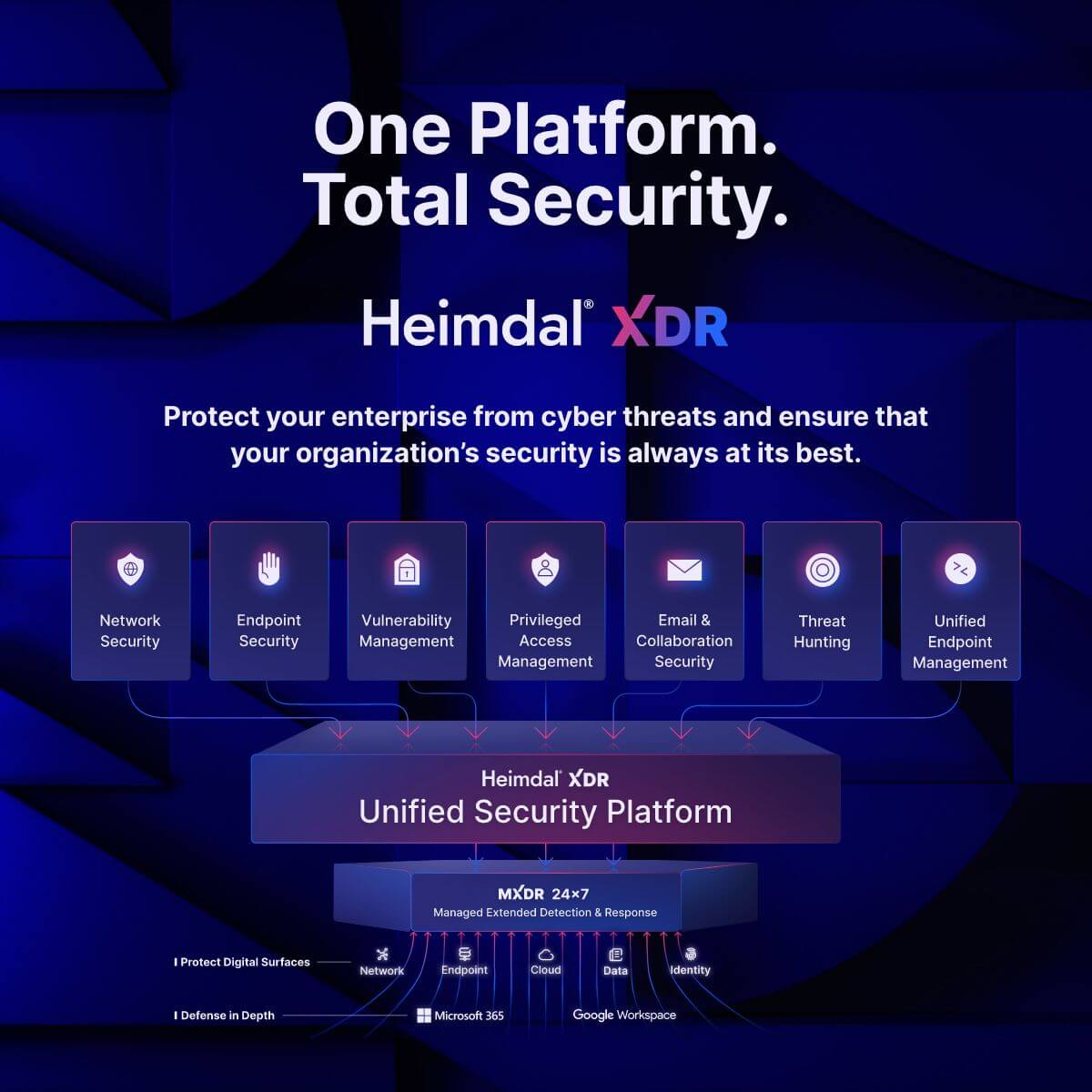Contents:
MSPs handle IT management, while MSSPs specialize in cybersecurity. MSPs ensure smooth operations, while MSSPs maintain a security posture. Both are essential — each with its unique role.
In this article, we’ll discuss their key differences!
What Is an MSP (Managed Service Provider)?
An MSP is a specialized company that oversees and maintains a client’s IT infrastructure and user systems from a remote location. They handle a range of tasks, including:
- Monitoring systems for performance and security issues.
- Managing software updates and patches for operating systems and applications.
- Ensuring data backups and disaster recovery solutions are in place.
- Providing technical support and troubleshooting for hardware and software issues.
- Managing network infrastructure, including routers, switches, and firewalls.
- Offering cloud services such as hosting, storage, and virtualization.
- Implementing cybersecurity measures such as antivirus software and firewalls.
- Conducting IT assessments and strategic planning for technology infrastructure improvements.
Additionally, MSPs offer specialized services in various technology areas, ensuring that clients have access to the latest advancements and best practices.
The benefits of hiring an MSP include:
- Cost savings by eliminating the need for in-house IT staff which requires additional resources and training.
- Access to skilled professionals with specialized expertise.
- Scalability, allowing easy adjustment of resources as needed.
- Predictable costs under a subscription-based model.
- Proactive support that addresses issues before they impact operations.
An MSP is kind of more of a traditional IT company… they are providing services that are going to make all the IT needs within a company more streamlined.
They’re going to have some type of remote management software, they’re gonna have a lot of monitoring software, they’re gonna have some type of security levels in place like a firewall.
Todd Ellis, CTO, Secure Networkers
What Is an MSSP (Managed Security Service Provider)?
An MSSP is a company that focuses on safeguarding organizations from cyber threats. They offer a range of cybersecurity services, including:
- Continuous monitoring and threat detection.
- Incident response and management.
- Vulnerability assessments and patch management.
- Compliance assistance and regulatory adherence.
- Security risk assessments and mitigation strategies.
- Security awareness training for employees.
- Security consulting and strategy development.
- Forensic analysis and digital investigations.
MSSPs continuously monitor for potential threats and provide real-time analysis to help their clients maintain a secure IT infrastructure.
The benefits of hiring an MSSP include:
- Enhanced cybersecurity posture through access to specialized expertise and advanced security technologies.
- Proactive threat detection and prevention, reducing the risk of data breaches and cyber attacks.
- 24/7 monitoring and response capabilities, ensuring rapid incident response and minimizing potential damage.
- Cost-effectiveness by outsourcing security operations, eliminating the need for in-house security personnel and infrastructure.
- Compliance assistance helps organizations meet regulatory requirements and avoid costly penalties.
- Peace of mind knowing that a team of dedicated professionals is continuously monitoring and protecting their digital assets.
Seventy-six percent of organizations report a cyber security skills gap. Obviously, there is a shortage of qualified cyber security professionals. MSSPs can bridge that gap by providing an in-demand skill set at an economy of scale that is difficult for most organizations to match.
Also, utilizing the right MSSP can allow an organization to focus their resources on the products and services of that particular organization. Further, since most security incidents require quick and agile response, an MSSP will have the capacity on-hand to adequately respond, in collaboration with a group of experts, something that most businesses cannot otherwise afford.
Tony Sabaj, Head of Channel Security Engineering for the Americas, Check Point
MSP vs MSSP: The Key Differences
In comparing MSPs and MSSPs, the primary difference lies in their focus: MSPs manage IT infrastructure, while MSSPs specialize in cybersecurity.
Goal Difference
MSPs aim to enhance business efficiency and productivity by optimizing IT operations — enabling clients to scale their operations seamlessly while ensuring the health and maintenance of their network and systems.
MSSPs aim to proactively mitigate cyber threats and decrease the risk of security incidents by continuously monitoring and protecting clients’ infrastructure, thereby safeguarding sensitive data and preserving business continuity.
Cybersecurity Service Difference
MSPs typically offer basic cybersecurity measures, such as system and email monitoring and application patching, aimed at providing fundamental protection against common threats.
MSSPs provide advanced cybersecurity solutions, including endpoint and network protection, threat detection and response, threat intelligence, and proactive threat hunting to defend against sophisticated cyber attacks and advanced threats.
Operational Approach Difference
MSPs operate from Network Operations Center (NOCs), where they oversee IT management tasks, provide technical support, and monitor system performance to ensure optimal operation.
MSSPs operate from Security Operations Center (SOCs), equipped with advanced tools and technologies to detect, analyze, and respond to security incidents in real-time, enhancing their ability to defend against cyber threats effectively.
Common Functionality Difference
MSPs commonly handle technical support, remote work monitoring, end-user management, and help desk services — focusing on optimizing business operations and facilitating smooth IT functioning.
MSSPs specialize in providing comprehensive cybersecurity services, including antivirus protection, threat detection and intelligence, security reporting, auditing, compliance enforcement, and access management, to strengthen clients’ security posture and mitigate cyber risks effectively.
The first thing organizations should look for is to make sure they are working with an MSSP and not an MSP (Managed Service Provider). The basic difference is that an MSP will manage devices or applications for uptime, health, and directed move/add/changes. Whereas an MSSP is providing the security expertise As-a-service, creating security policy, security monitoring and response to security incidents.
Secondly, organizations should look for expertise in their specific field/vertical. There are security controls that are universal for almost all organizations, but —especially when it comes to compliance and governance— the security controls differ based on industry. Make sure that an MSSP is taking into account regulations or frameworks that an organization needs to adhere to, including ISO 27001, HIPAA, PCI, GDPR, and NERC, just to name a few.
Tony Sabaj, Head of Channel Security Engineering for the Americas, Check Point
MSP vs MSSP vs MDR
MDR (Managed Detection and Response) is a cybersecurity service that provides continuous monitoring, threat detection, and incident response capabilities to protect organizations from cyber threats. It employs advanced technology, threat intelligence, and human expertise to detect and respond to security incidents in real-time.
MDR services offer several key capabilities:
- Threat Hunting: Proactive scanning of networks and systems to detect active attacks, complementing reactive methods. MDR providers use human intelligence to identify elusive threats missed by automated defenses.
- Prioritization: Automated rules and human review separate benign occurrences from real dangers, refining alerts into a stream of high-quality, contextualized alerts.
- Investigation: MDR services provide context to understand risks quickly, aiding in the investigation of incidents and facilitating efficient responses.
- Remediation: Restoring systems to a pre-attack state and removing persistent mechanisms to prevent further compromise, including malware removal, registry cleaning, and intruder ejection.
- Reporting: Accurate reporting provides insights into cybersecurity posture, with MDR solutions offering verifiable, easily accessible, and practical reporting on security incidents and outcomes.
The Key Differences: MSP vs MSSP vs MDR
MSP (Managed Service Provider):
- Focuses on managing and maintaining IT infrastructure.
- Provides services like remote monitoring, patch management, and help desk support.
- Does not typically specialize in cybersecurity.
MSSP (Managed Security Service Provider):
- Specializes in cybersecurity services.
- Offers services such as managed firewall, intrusion detection, and vulnerability assessments.
- Focuses on safeguarding against cyber threats.
MDR (Managed Detection and Response):
- Specializes in threat detection and incident response.
- Provides continuous monitoring and response capabilities.
- Utilizes advanced technology and human expertise to detect and respond to security incidents in real-time.
Can an MSP be an MSSP?
Yes, an MSP can evolve into an MSSP. For example, a company currently offering IT infrastructure management services might decide to broaden its scope to include comprehensive security solutions.
To achieve this transition, the company would need to invest in security expertise, tools, and technologies. Additionally, obtaining relevant certifications and forging partnerships with security vendors would be essential steps.
By expanding its service portfolio to encompass offerings such as threat detection, incident response, vulnerability management, and compliance assistance, the company can effectively transition into an MSSP.
Here’s a comprehensive overview of how an MSP can transition into an MSSP:
Identifying Market Demand: The company conducts market research to understand the demand for security services among its target audience. It identifies areas where businesses are seeking assistance with threat detection, incident response, compliance, and overall cybersecurity posture improvement.
Investing in Security Expertise: To deliver effective security solutions, the company invests in hiring or training security professionals with expertise in areas such as threat intelligence, security operations, and compliance frameworks. These experts play a crucial role in assessing security risks, implementing preventive measures, and responding to security incidents effectively.
Expanding Service Portfolio: With the newly acquired security expertise, the company expands its service portfolio to encompass a wide range of managed security services. This includes offerings such as:
- Continuous monitoring and threat detection to identify and mitigate cybersecurity threats in real-time.
- Incident response services to contain and remediate security incidents promptly.
- Vulnerability management to proactively identify and address security vulnerabilities in IT systems.
- Compliance assistance to help businesses navigate and adhere to industry-specific regulations and standards.
Obtaining Certifications and Partnerships: To demonstrate credibility and expertise in the field of cybersecurity, the company pursues relevant certifications and partnerships with leading security vendors. Achieving certifications such as SOC 2 and ISO 27001 or becoming a certified partner of cybersecurity solution providers strengthens the company’s ability to deliver high-quality security services to its clients.
Implementing Robust Security Protocols: The company establishes robust security protocols and processes within its organization to ensure the confidentiality, integrity, and availability of clients’ data. This involves implementing industry best practices, conducting regular security assessments, and adhering to compliance requirements.
Does My Business Need an MSP or an MSSP
The decision between an MSP and an MSSP is based on your company’s specific circumstances, priorities, and goals. Whether you need comprehensive IT management, specific cybersecurity skills, or a combination of the two, properly examining your options will allow you to make an informed decision that corresponds with your company’s objectives.
Here’s a breakdown to help you determine which option is best suited for your business:
Consider an MSP if
You Require Comprehensive IT Management: If your primary concern is managing day-to-day IT operations, such as network monitoring, software updates, and help desk support, an MSP is an excellent choice. MSPs specialize in providing a wide range of IT services to ensure the smooth functioning of your technology infrastructure.
You Have Limited IT Resources: If your business lacks dedicated IT staff or expertise, partnering with an MSP can provide you with access to a team of skilled professionals without the need for hiring internally. MSPs act as an extension of your IT department, offering expertise and support to keep your systems running optimally.
You Need Scalable Solutions: MSPs are well-equipped to scale their services according to your business’s growth and changing IT requirements. Whether you’re expanding your operations or adding new technology solutions, an MSP can adapt to accommodate your evolving needs.
Consider an MSSP if
You Prioritize Cybersecurity: If protecting your sensitive data and mitigating cybersecurity threats are top priorities for your business, an MSSP is the ideal choice. MSSPs specialize in delivering advanced security solutions, including threat detection, incident response, and compliance assistance, to safeguard your digital assets.
You Lack Specialized Security Expertise: If your organization lacks in-house cybersecurity professionals or specialized knowledge to address evolving threats, partnering with an MSSP provides access to dedicated security experts and cutting-edge technologies. MSSPs can help you stay ahead of cyber threats and ensure regulatory compliance.
You Operate in Highly Regulated Industries: Industries such as healthcare, finance, and government are subject to strict regulatory requirements regarding data protection and privacy. An MSSP can assist you in meeting compliance standards, conducting audits, and implementing robust security controls to avoid regulatory penalties and reputational damage.
Consider both if
You Need Comprehensive IT Management and Robust Security: Some businesses may benefit from a hybrid approach that combines the services of both MSPs and MSSPs. This allows you to leverage the expertise of MSPs for general IT management while relying on MSSPs for specialized cybersecurity solutions.
You Want to Balance Costs and Security: Balancing budget constraints with the need for robust security is essential for many businesses. By opting for a combination of MSP and MSSP services, you can allocate resources strategically to ensure comprehensive IT management and cybersecurity without exceeding your budget.
You Seek Flexibility and Scalability: The hybrid approach offers flexibility and scalability, allowing you to adjust the balance between MSP and MSSP services based on changing priorities, threats, and business requirements. This ensures that you can tailor your IT and security solutions to meet your specific needs effectively.
Heimdal® – Unified Cybersecurity Tools for MSPs
Managed Service Providers around the world rely on Heimdal®’s comprehensive range of cybersecurity tools to manage their customers’ environments.

Our all-in-one solution means you have a reliable method to easily monitor for threats and resolve issues fast. The platform gives you tools for:
- Network security
- Vulnerability management
- Privileged access management
- Endpoint management
- Threat hunting
- Email and collaboration security
- And more
If you’re offering cybersecurity as one of your managed services, Heimdal® provides everything you need to succeed.
Join Our Partner Program: Partner NEXUS
And moreover, Heimdal®’s Partner NEXUS program is now live and you can join in!

NEXUS (Network of Excellence, Unity, and Safeguarding) is a global initiative tailored for MSPs, MSSPs, distributors and resellers that aims at improving customer security and expanding business opportunities.
Why to join in? As an MSP, MSSP, distributor or reseller, you gain access to a comprehensive cybersecurity kit, user-friendly platform that simplifies security management, and extensive training and support for you to focus on growth and turn the tide against cyberattacks. Moreover, you get the best in cybersecurity:
- The most extensive XDR suite in the market.
- Unified management for simplified control.
- Next-level threat intelligence.
- Reliable and efficient cloud-native architecture.
- Innovative telemetry and responsive capabilities.
- Managed SOC services with exceptional support.
Conclusion
While both MSPs and MSSPs play crucial roles in managing and securing IT infrastructure, they serve distinct purposes. MSPs primarily focus on overall IT management and support, while MSSPs specialize in providing advanced security services and expertise to protect against evolving cyber threats.
Organizations must carefully evaluate their specific requirements and risk profiles to determine whether they need the broad-based support of an MSP, the specialized security focus of an MSSP, or a combination of both.
By understanding the nuances between these service models, organizations can make informed decisions to fortify their IT infrastructure and defend against emerging cyber threats effectively.
MSP Vs MSSP FAQs
What is the difference between MSP and MSSP?
An MSP provides a wide range of IT operations and infrastructure management services, whereas an MSSP specializes in cybersecurity services and typically operates from a security operations center (SOC).
What is the difference between MSP and SOC?
MSP offers a range of IT services for overall infrastructure management, while SOC (Security Operations Center) specializes in cybersecurity threat detection and response within organizations.
For example, a large financial institution might engage an MSP to handle their IT infrastructure, ensuring smooth operations across servers, networks, and software applications. Additionally, they could establish a Security Operations Center (SOC) staffed with cybersecurity specialists who monitor for and respond to threats like phishing attacks or unauthorized access attempts to their sensitive financial data. The MSP ensures overall system health, while the SOC focuses on cybersecurity protection.
What is the difference between MSSP and MDR?
The main difference is that MDR is a full-service solution, whereas an MSSP is a provider that facilitates a solution. In co-managed conditions, an MSSP manages a customer’s tools on their behalf, while the MDR side monitors data from those tools to triage and alert customers of threats.
What is the difference between MSP and VMS?
MSP (Managed Service Provider) offers IT services to businesses, while VMS (Vendor Management System) helps manage relationships with external vendors and suppliers.
For example, a company might engage an MSP to handle its IT infrastructure, ensuring smooth operations, while using a VMS platform to manage relationships with various vendors supplying goods or services, such as temporary staffing or raw materials.
How many types of MSPs are there?
MSPs are of three types: lower-level, mid-level, and high-level MSPs. These categories are characterized by the extent of the services provided to clients.


 Network Security
Network Security
 Vulnerability Management
Vulnerability Management
 Privileged Access Management
Privileged Access Management
 Endpoint Security
Endpoint Security
 Threat Hunting
Threat Hunting
 Unified Endpoint Management
Unified Endpoint Management
 Email & Collaboration Security
Email & Collaboration Security












